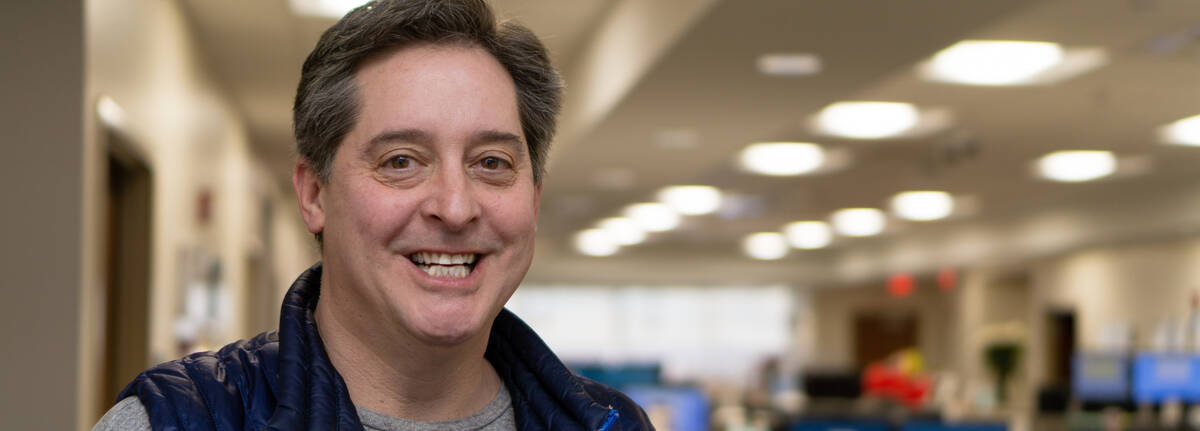
Featured Story 15 June 2021
Testicular Cancer Awareness
As we tee up for Men’s Health Week, we aim to bring awareness to preventable men’s health concerns and encourage early detection.
Between 18 to their mid-30s, most men would consider their health to be in its prime. It is also between the ages of 15 to 35 that they are most likely to receive a diagnosis of testicular cancer.
“Testicular cancer is a young man’s cancer, which kind of separates it from a lot of other cancers that increase in frequency as you get older,” Ivinson’s urologist, Dr. Eric Uhlman said.
1 in 250 males will develop testicular cancer in their lifetime. Despite less frequent diagnosis in comparison to other cancers, testicular cancer is one of the most treatable forms of cancer. Similar to most cancer diagnoses, cases caught in early stages tend to yield the best outcomes.
In his third year at Ivinson Medical Group, Dr. Uhlman sees patients from pediatrics to geriatrics with ranging issues from incontinence, stone disease, male infertility and urologic cancers. His one piece of advice to patients? Don’t ignore lumps and bumps.
“I think that young guys should be aware that they are at risk,” Dr. Uhlman said of the increasing rate of testicular cancer. “Young and middle-aged men are the high-risk group and any painless or suspicious lump needs to be evaluated.”
Commons testicular cancer symptoms include:
- Lump or swelling in the testicle.
- Pain.
- Feeling heaviness/aching in the lower abdomen and/or scrotum.
- Breast growth or soreness.
- Signs of puberty in young boys.
Some men will not experience any symptoms at all, which makes routine preventative visits to your primary care provider (PCP) especially important. Visiting your PCP annually not only helps establish a baseline but can also screen for and detect health concerns (such as cancer) before they become bigger issues.
“Part of the problem is that testes cancer doesn’t have symptoms in early stages,” Dr. Uhlman said. “It’s really more frequently found on physical examination and then confirmed by ultrasound. In advanced stages, you can start to experience flank pain, shortness of breath, abdominal pain and headaches.”
When it comes to screening for and detecting testicular cancer, Dr. Uhlman recommends a hands-on approach.
“I do subscribe to promoting self-exams for testicular cancer and the reason is it’s an easy exam to do. These are organs that are readily accessible.”
But what should you do if you detect a lump or a bump that wasn’t there before? The answer is to not wait and call your doctor.
“Testicular cancer is a fast growing cancer,” Dr. Uhlman warns. “We sometimes see the problem where men detect a lump and they just ignore it. In fact, it’s a well-known statistic that men who are unmarried present with later stage testicular cancer. In married patients, oftentimes their partner may feel something that wasn’t there before and say, ‘you’re going to the doctor’. It’s a common occurrence in urology that married men tend to present earlier.”
Risk factors associated with developing testicular cancer tend to vary, but the most common risk factor includes having a history of an undescended testes and requiring surgical intervention.
Like with any cancer, treatment type varies depending on the stage and type of cancer. These factors are determined during blood work and ultrasound. A very small percentage of the time, testicular cancer will affect both testes.
“It really is one of the most treatable forms of cancer,” Dr. Uhlman said in comparison to treatment of testicular cancer in the 60’s which resulted in surgical removal of the testicle. “Now, the number of people who need surgery for their testicular cancer is pretty small and it is reserved for cases that do not normalize after chemotherapy.”
Due to the nature of chemotherapy, it is common practice for men diagnosed with testicular cancer to bank sperm prior to treatment.
“Infertility is a concern,” Dr. Uhlman said but noted that fertility concerns have also led to diagnosis. “In fact, sometimes there is something about testicular cancer that can intrinsically cause infertility to where, if people present with infertility, it’s important to do a good testicle examination because having testicle cancer can cause infertility.”
Despite a lower rate of testicular cancer diagnosis, raising awareness around the signs and symptoms remains important. Due to the rapid growth of testicular tumors, Dr. Uhlman’s staff at Ivinson Medical Group make patient calls regarding testicular swelling and lumps a top priority.
“It’s vitally important to raise awareness, especially in a university town,” Dr. Uhlman said. “Testicular cancer is a highly curable malignancy when caught in the early stages and the detection is very straight forward with a testicular self-exam. Any suspicious lesion should be evaluated by a healthcare provider as soon as it is detected because, in early stages, it is highly curable.”